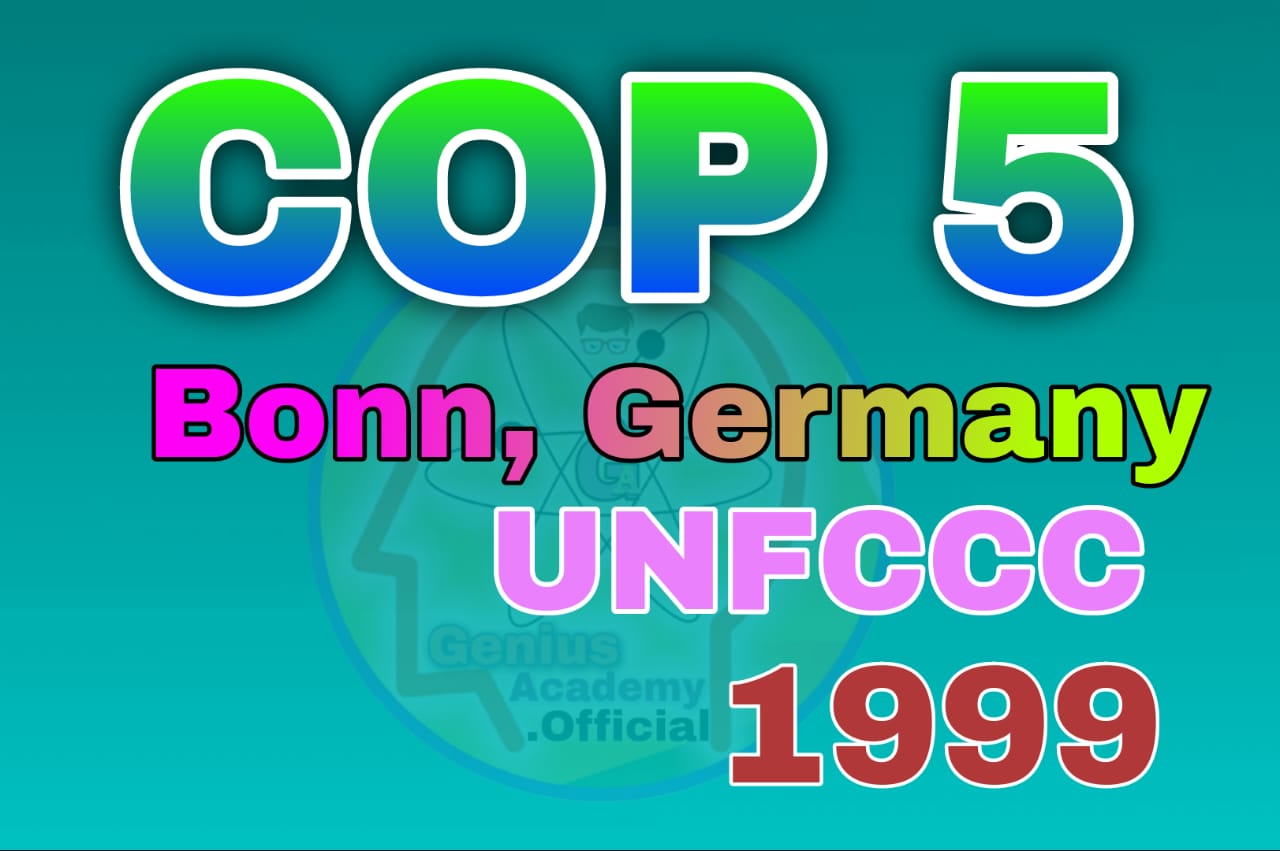COP-5 : Bonn Summit
The fifth session of the Conference of the Parties (COP-5) to the United Nations Framework Convention on Climate Change (UNFCCC) took place in Bonn, Germany, from 25 October to 5 November 1999. Building on the work from previous COP sessions, COP-5 focused on advancing the goals of the Buenos Aires Plan of Action (BAPA) and preparing for the implementation of the Kyoto Protocol.
Overview of COP-5
- Location and Duration:— Held in Bonn, Germany, from 25 October – 5 November 1999.
- Participation:— Over 3,000 participants from 165 Parties attended the conference.
- Objective:— To build on the BAPA, which aimed to strengthen the implementation of the FCCC and lay the groundwork for the Kyoto Protocol’s entry into force.
Background: Buenos Aires Plan of Action (BAPA)
The Buenos Aires Plan of Action, adopted at COP-4 in 1998, outlined key objectives for climate action:
- Timeline:— BAPA established a two-year deadline for reinforcing FCCC commitments and preparing for Kyoto Protocol enforcement.
- Focus Areas:— BAPA prioritized financial and technological support to developing countries and setting guidelines for reporting emissions, advancing monitoring systems, and setting up regulatory measures for emissions reduction.
Structure of COP-5
COP-5 used various groups and informal consultations to organize its work, including:
- Subsidiary Body for Implementation (SBI):— Focused on implementing the UNFCCC by addressing the logistics and resources needed for effective climate action.
- Subsidiary Body for Scientific and Technological Advice (SBSTA):— Provided scientific, technological, and methodological advice on climate-related topics to inform policymaking.
- Contact Groups and Joint Working Group:— Eight contact groups and a joint SBI/SBSTA working group collaborated to facilitate decision-making and consultation among delegates.
Key Achievements at COP-5
- Adoption of Draft Decisions and Conclusions:— COP-5 concluded with the adoption of 32 draft decisions covering various aspects of climate policy and FCCC provisions. Key areas of focus included:
- Reviewing the Implementation of FCCC Commitments:— Evaluated progress on existing commitments and set new goals for Parties.
- Preparing for COP/MOP-1:— Established preparations for the first Meeting of the Parties to the Kyoto Protocol (COP/MOP-1), which would be essential for the Protocol’s future enforcement.
High-Level Segment and Statements from Leaders
During a two-day high-level segment on 2-3 November, 93 ministers and heads of delegations provided their perspectives on climate change:
- Positive Outlook:— Many delegates expressed optimism regarding the outcomes of COP-5, emphasizing the momentum regained following COP-4 in Buenos Aires.
- Commitment to Kyoto Protocol Entry by 2002:— Delegates conveyed a shared determination to ensure the Kyoto Protocol’s timely ratification and enforcement, targeting 2002 for its entry into force.
Outcomes and Significance of COP-5
- Strengthened Climate Action Momentum:— COP-5 revived the climate action momentum and generated optimism among delegates for subsequent COP meetings.
- Focus on Long-Term Climate Goals:— This session laid the groundwork for establishing future protocols and reinforcing long-term climate commitments.
- Preparations for Kyoto Protocol:— COP-5 paved the way for the Kyoto Protocol’s implementation by addressing essential steps and compliance mechanisms to be discussed in upcoming sessions.
Conclusion
COP-5 was a significant milestone in global climate action, contributing to the successful advancement of the UNFCCC goals and reinforcing the international commitment to addressing climate change. The conference concluded with renewed determination to implement the Kyoto Protocol, setting a foundation for more ambitious goals at COP-6 and beyond.

